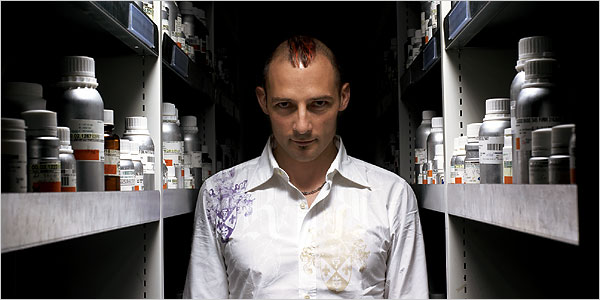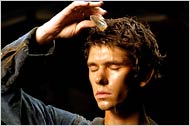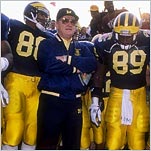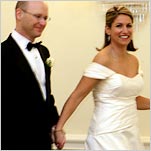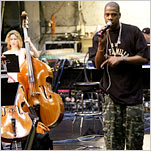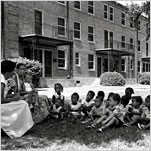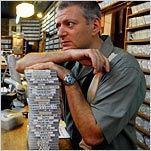Patrick Süskind’s 1985 novel, “Perfume,” is a macabre murder mystery, the story of an awkward, alienated genius. But it is really a story about smell. The novel opens with the vile stench of Paris in 1738 — foul breath, human body stink, overflowing gutters — and the birth of Jean-Baptiste Grenouille, arriving into this fragrant world without a scent of his own but with an extraordinary sense of smell. Fresh mint. Raw lumber. Spring jasmine. The 25 virgins that Grenouille grows up to murder in order to possess their scent. “Perfume” became an international phenomenon and mesmerized millions of readers through the power and the nature of smell itself.
Multimedia
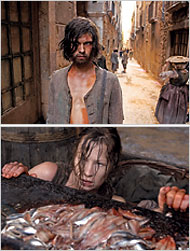
Scenes from "Perfume" and the scents they inspired. ERMITE, top, and PARIS 1738, above.
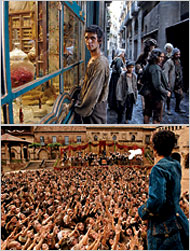
AMOUR AND PSYCHE, top, and ORGIE, above.
A young Frenchman named Christophe Laudamiel was still in perfumery school when he first read Süskind’s book. What struck Laudamiel most was a description of ripe, juicy pale yellow plums and the girl who sells them to Grenouille, the first virgin he murders.
But what also struck him were his own similarities to Grenouille. Tall and painfully thin, the young Laudamiel wasn’t social. He didn’t always feel comfortable with people. He wore a red mohawk. In the novel, when Grenouille retreats to a cave in the middle of France to live the life of a hermit for seven years, Laudamiel understood. The day I become a perfumer, he said to himself, I will do something with this book. And with the long-awaited production of the film based on the book (“Perfume” appears in theaters this month), Laudamiel finally got his chance.
Today, Laudamiel works for the giant fragrance corporation I.F.F. (International Flavors and Fragrances); I.F.F.’s perfumers are responsible for the scents for many of the world’s luxury brands. Widely regarded as a great nose in the making, Laudamiel has made perfumes for Hilfiger, Aramis and Slatkin & Company, among others. For several years he has also been working on a side project. In 2000 he started systematically recreating the pivotal scenes of this murderer’s story in scents, one by one.
Laudamiel would work on the novel’s scents alone, on his own time, evenings, weekends. No one knew he was doing it. He spent nights in the lab, mixing and remixing to find, say, the exact smell of freshly tanned leather, and would go home at 6 a.m. The first scent he created was Ermite (Hermit), the smell of the cave: damp stone, moss, pine, mountain wind, cold. He created Amour and Psyche, the best-selling perfume that Grenouille copies perfectly from scratch in the novel. Strangest of all, however, was Virgin No. 1, the scent of the girl who sold those yellow plums in the Paris streets. Years ago, an I.F.F. scientist recruited two young female virgins and, with their parents’ permission, recorded their aroma using a polymer needle. Laudamiel found this scent on I.F.F.’s shelves, then added the scents Süskind describes as clinging to the virgin’s skin: apricot, nuts, sea breeze.
Finally, Laudamiel took a deep breath and told Nicolas Mirzayantz, I.F.F.’s group president in charge of fragrances, about what he had been up to. Mirzayantz was fascinated by one scent in particular, something Laudamiel called Human Existence. It was the scent the scentless Grenouille creates for himself. “You must remember,” Laudamiel says, “this character’s being born without a scent has made him terribly lonely, lost, ignored. Having his own scent makes him whole. It makes him human.”
On a fortuitous afternoon last year, Mirzayantz had tea at the SoHo Grand Hotel with a German movie producer named Thomas Friedl. For years, various people had begged the reclusive Süskind for the film rights to his novel, and finally, he had relented. Friedl’s production company, Constantin Film, was making “Perfume,” with Tom Tykwer (“Run Lola Run”) directing and starring the young British actor Ben Whishaw as Jean-Baptiste Grenouille and Dustin Hoffman as the once great perfumer Giuseppe Baldini. They didn’t know how, exactly, but they wanted some sort of perfume to go with the movie, Friedl said.
Two weeks later, in Paris, Laudamiel presented himself at a meeting with Friedl and Vera Strubi, the head of Thierry Mugler perfumes, one of the most daring and innovative of perfume houses — it had created the revolutionary Angel and the outstanding Cologne — at I.F.F.’s new light-filled, modern offices. Laudamiel could not help being reminded of the moment in the novel when Grenouille asks Baldini for an apprenticeship and must prove to him his perfumery talents. Strubi and Friedl smelled raw tannery leather, the sea scent Grenouille loves, medieval Parisian stone streets foul with sewage (Laudamiel used a cassis note for urine, and pyrozine molecules for the other sewage effects). They were mesmerized. They found themselves experiencing the book, its details and its characters. Strubi loved Laudamiel’s smells, the good as well as the bad.
It was agreed that Mugler would perfect 14 scents and package them in a special coffret — Paris 1738, Atelier Grimal and Orgie among them. But Strubi also wanted him to create a 15th scent for Thierry Mugler, a perfume that captured the essence of Süskind’s book. The obvious choice would be to try to create the perfume Grenouille makes from the scent of the murdered virgins. But that was impossible (by definition it didn’t exist), and not to mention, Strubi said, too pretentious.
As Strubi and Laudamiel watched the rough-cut scenes of the film together, she came up with a different idea. What if you could create a perfume that would enhance your own unique smell, a perfume that would smell different on you than on anyone else? In other words, your scent identity.
Laudamiel was at once excited and dubious. Technically it was daunting. And they didn’t have much time; Constantin was shooting the movie quickly; they were hurrying to make the premier. He flew back to his lab in New York and started working on this perfume, which they eventually decided to call Aura. It would have to interact with skin. No head, no heart, no base. Perfectly dosed so that before you put it on, it essentially smelled like nothing.
That summer, Laudamiel made repeated trips to Paris and Munich with his latest work in progress. He started with parts of fresh, dark, oriental floral. It didn’t work at all, the Mugler people told him. Dry, a bit hard, very powdery. Laudamiel revised accordingly. He put in excellent synthetics like Habanolide and Muscenone. He built Aura in a silicon base, so it would become a second skin. He used linalyl anthranilate, an unusual white floral that increases potency and acts as a bridge between smells. He was making the reverse of a Mugler signature fragrance; a perfume that had no discernible identity, no distinguishing features.
Aura was finished just as the final edits were being made on the movie. Laudamiel was exhausted but pleased. At the end of the novel, when the people of Paris encounter Grenouille doused in the scent that finally gives him an identity, they find him so irresistible that they literally eat the perfumer alive. “You must remember,” Laudamiel said, “that the worst insult is to be ignored. That those who have no smell are nobody.”



